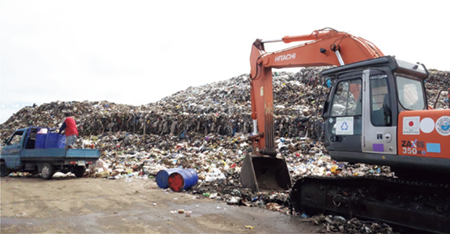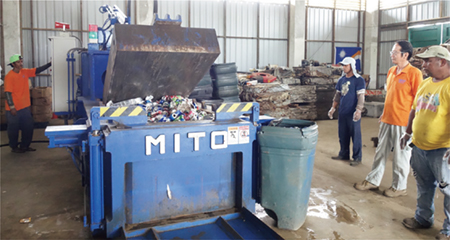Stories from the Field 11
Solving Garbage Disposal Issues and Introducing a Recycling System
– Plan to Build a Recycling Center in the Marshall Islands
Republic of the Marshall Islands is a small country situated 800 km north of the equator in Micronesia consisting of more than 1,200 islands and a population of over 50,000 people. It is called the “Pearl necklace of the Pacific” because of its beautiful round shape.
Today, this small country faces a garbage disposal problem in the capital city, Majuro. In Marshall, the people have lived a traditional life and most of their waste was returned to nature. In recent years, however, various goods have been imported as the people's lives have become westernized, resulting in large amounts of garbage that cannot be decomposed naturally, such as plastics and metals that had never existed on the land before. Additionally, the amount of garbage has rapidly increased from around 23 tons to 30 tons per day over the past four years since 2013. Yet, Marshall did not have a garbage disposal facility nor the technologies for garbage disposal. Marshall was not able to cope with this change, and thus the garbage continued to pile up into a mountain due to a lack of the capacity for garbage disposal.

The garbage disposal area of Majuro Atoll Waste Company. The mountain of garbage reaches around 10 meters tall in some places. (Photo: The Embassy of Japan in Marshall)
Given these circumstances, Marshall requested to Japan to provide technical assistance for the proper management of waste and the promotion of recycling. To resolve this issue, Mr. Masahiro Tomino, a Senior Volunteer from JICA, was dispatched as an expert in garbage disposal. He described the situation when he first arrived as follows.
“When I arrived, the pile of garbage was already nearly 10 meters high, which was over the point where it could not be spread by a strong wind. The garbage contained a large amount of materials which are difficult to decompose, such as plastics and metals. It was assumed that this garbage could be scattered over these beautiful islands and plastic bags could float over the country's coral reefs.”
There are unique aspects of the Marshall Islands in the back ground of this garbage disposal issue. Nearly the entire country is made up of atolls formed by coral reefs. This means the country is entirely flat and could not bury garbage in valleys like in Japan. As a result, garbage is just piled up like a mountain. Another aspect is that the country does not have enough soil to cover the garbage, making it easy for flies and harmful insects to breed.
Mr. Tomino's activities took two ways in order to solve these issues. The first way was to reduce the mountain of garbage. He focused on removing recyclable items from the pile and treated them appropriately, and introduced an incineration facility of general garbage tentatively to examine whether it could be used sustainably, while checking impacts on the surroundings. The second way was to promote recycling activities to homes, stores and schools, which generate garbage.
At the time of Mr. Tomino's arrival in Marshall, a recycling center was constructed by Majuro Atoll Waste Company, which is responsible for garbage disposal in the Majuro Atoll, using a grant aid from the Ministry of Foreign Affairs of Japan, and one waste metal compactor and one PET bottle compactor had just been installed there.
Mr. Tomino provides technical guidance to facilitate the introduction of the equipment for local people to understand how to operate it and be able to manage the equipment on the daily life.

The waste metal compactor being used at the recycling center built with a grant from Japan. Mr. Tomino is the second man from right. (Photo: The Embassy of Japan in Marshall)
He also continues to participate in outreach meetings in homes, schools and communities to raise awareness about the reuse of items that used to be thrown away as garbage and the need for recycling.
Currently, the garbage disposal issue has become one of the most important issues for the entire Marshall, and various attempts have been made to resolve it. For example, it is regulated by law not to use material that is difficult to decompose such as trays, cups made from styrofoam and plastic shopping bags. The country also plans to introduce a system for collecting a deposit for cans and PET bottles at the time of purchase that can be refunded after collection.
“The garbage disposal issue cannot be solved in only one or two years, when you think about the goal of exporting materials made from recycling. This means I will not be able to see all within my term here. However, I hope that a garbage sorting and collection system can be completed in around five years and a system for exporting high value-added recycled materials using scale merits will be established within 10 years through cooperation with neighboring Pacific Island countries. I am working hard on activities today with an eye on these goals for the future,” says Mr. Tomino, whose activities continue with high expectations.
<< Previous Page
Main Text | Statistics and Reference Materials | Stories from the Field | Master Techniques from Japan to the World | ODA Topics
